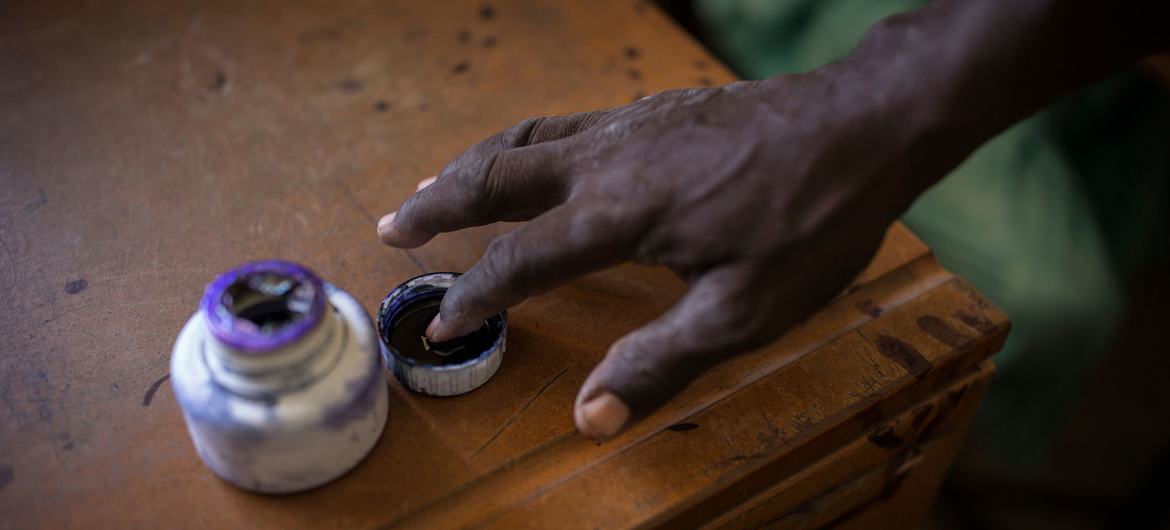
‘Mega election’ 2024 could be a landmark for democracy: UN rights chief
UN Photo/Marco Dormino A voter’s finger is dyed with ink after casting a vote in elections .
United Nations, 4 March 2024
Dozens of elections taking place this year around the world will likely be “free from hatred” and respect the will of the people, but there are warning signs that several polls may not, including Bangladesh, Chad, Hungary, Russia and Senegal, UN rights chief Volker Türk warned on Monday.
In an update to the UN Human Rights Council, Mr. Türk described 2024 as a “mega election year” with more than 60 countries slated to hold elections involving nearly half of the world’s people.
“Every election – even an imperfect one – constitutes an effort to at least formally acknowledge the universal aspiration to democracy,” the UN High Commissioner for Human Rights said, citing “serious concerns” about polls in several countries.
Elections and recommendations
In Chad, Mr. Türk highlighted with concern the killing of opposition leader Yaya Dillo in the country’s capital, N’Djamena, last week. “I call for a transparent, timely and independent investigation and for Chad’s transition ahead of upcoming elections to respect fully international human rights law,” he insisted.

In Hungary, the UN rights chief maintained that although the “formal structure of election” still existed there, civic freedoms had been restricted as power had been concentrated in the hands of the government while the judiciary was “deeply undermined”, and the media’s ability to scrutinise elected officials had been “eroded”.
“In India, with an electorate of 960 million people, the coming election will be unique in scale,” the High Commissioner for Human Rights continued, expressing concerns about restrictions on civic space, hate speech and discrimination against minorities, especially Muslims.
Turning to Iran, Mr. Türk noted that recent elections had occurred against a backdrop of deep divisions caused by repression of widespread protests linked to the death in police custody of Jina Mahsa Amini, reportedly detained for not wearing her headscarf properly. Urgent reforms remain necessary to uphold the rights of all Iranians, especially women, and to halt the use of the death penalty, UN rights chief said.
And as Libya gears up for long-delayed elections amid ongoing civil strife that has divided the country in two following the overthrow of late President Muammar Gaddafi, Mr. Türk said that genuine efforts were required to build unified and legitimate institutions and create a free and safe civic space.
The Russian Federation meanwhile had escalated repression of dissenting voices ahead of the presidential election, Mr. Türk maintained. Several candidates have been barred from running for elected office while thousands of politicians, journalists, human rights defenders, lawyers and social media users faced administrative and criminal charges for “distributing information deemed to be false about Russia’s armed forces”. The situation appears to have worsened in recent months, with even cultural figures now targeted, the UN rights chief added.
“The death in prison of opposition leader Alexei Navalny adds to my serious concerns about his persecution,” Mr. Türk said, urging a “swift and comprehensive review of all cases of deprivation of liberty that result from the exercise of fundamental freedoms”.
In Senegal, where the presidential election was cancelled last month, Mr. Türk urged the authorities to hold it “as soon as possible”. The UN rights chief also called for the release of close to 1,000 opposition members and activists reportedly arrested since 2021. “I encourage the government to ensure that the proposed national dialogue includes genuine participation by people of all political views,” he said.
In the United States, efforts to ensure free and fair elections were underway, Mr. Türk noted, despite curbs on postal votes reportedly introduced in 18 states after the 2020 presidential election – and expanded in 22 – following concerns about voter fraud. Equal rights and the value of every citizen’s vote needed be emphasized, particularly in a context of intense political polarization, the High Commissioner said. The US presidential election takes place on 5 November.

The original article appeared here.